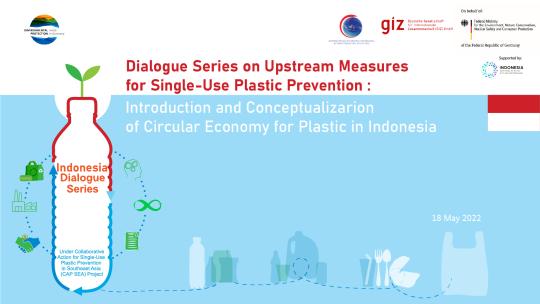Introduction and Conceptualization of Circular Economy for Plastic in Indonesia
Europe/Berlin: 9:00 - 10:45am

Existing production and consumption patterns in Southeast Asian countries including Indonesia are mostly based on a linear commodity economy. The current linear economy with take-make-dispose pattern has created negative externalities on the environment, economy, and people’s well-being. With this regard, transition toward circular economy is expected to reduce the negative externalities and supports Southeast Asian countries toward sustainability through resource optimization, designing out waste, and lower production costs.
Indonesia’s circular economy embraces a broad set of interventions across all sectors and activities focused on the 5Rs: Reduce, Reuse, Recycle, Refurbish, and Renew. The Economic, Social, and Environmental Benefits of a Circular Economy in Indonesia report has acknowledged the substantial role of 5 priority sectors, food and beverage, textiles, construction, wholesale & retail trade and electronic, that represent 1/3 of Indonesia’ GDP and employed more than 43 million people in 2019. Current practices in these sectors are inefficient and generate large amounts of waste, including plastic waste. To this end, Indonesia has made an ambitious goal to reduce global ocean plastics leakage with the enactment of Presidential Regulation No. 83/2018 on Marine Debris Management with 70% plastic waste reduction by 2025 against the baseline year (2017).
The urgency to accelerate systemic transformation toward circular economy specifically in plastic sector is obvious. According to the analysis provided in the National Plan Action Partnership (NPAP) Indonesia Multistakeholder Action Plan report, if Indonesia is preserving the status quo of its linear economy, plastic waste generation is projected to increase by 1.9 million tonnes (+28%) while plastic leakage to water bodies is projected to increase by 120,000 tonnes per year (+30%) in 2025 from 2017 baseline[1]. In contrast, under the same analysis using just transition lens, comprehensive efforts and investments across the entire plastic system not only will significantly reduce plastic leakage to waterways and oceans, but also curb 20 million tonnes of greenhouse gasses emissions per year (27% less than 2017 emissions), create more than 150,000 direct jobs, improve public health outcomes by reducing air pollution, and advancing gender equality and social justice[2].
This episode of the dialogue's series will provide a platform to have a shared understanding of the contextualization of circular economy for plastic in Indonesia and the opportunity to gain knowledge on global upstream and downstream measures to move toward circular plastic economy.
The dialogue series is part of the project “Collaborative Actions to Reduce Single-Use Plastic in South-East Asia (CAP-SEA)”, which is part of a global project “Export Initiative for Green Technologies”, funded by the German Federal Ministry for the Environment, Nature Conservation and Nuclear Safety and Consumer Protection (BMUV).
[1] The Global Plastic Action Partnership in collaboration with the Indonesia National Plastic Action Partnership, Radically Reducing Plastic Pollution in Indonesia: A Multistakeholder Action Plan, 16.
[2]The Global Plastic Action Partnership in collaboration with the Indonesia National Plastic Action Partnership, Radically Reducing Plastic Pollution in Indonesia: A Multistakeholder Action Plan, 7.
Agenda
| Jakarta/Bangkok Time | Activity | Speaker |
|
14.00 – 14.05 |
Welcome and Dialogue Series Rule |
Host CAP SEA Team |
|
14.05 – 14.10 |
Keynote Speech
|
Mr. Rofi Alhanif Assistant Deputy of Waste and Waste Management The Coordinating Ministry of Marine and Investment Affairs |
|
14.10-14.15 |
Keynote Speech |
Mrs. Tuti Hadiputranto Indonesia NPAP Chairwoman |
|
14.15 – 14.20 |
Greetings and CAP SEA Introduction
|
Mrs. Gitafajar Saptyani Deputy Principal Advisor CAP SEA, GIZ Indonesia |
|
14.20 – 14.25 |
Fun Quiz |
Host CAP SEA Team |
|
14.25 – 14.40 |
Circular Economy Action Plan in Indonesia |
Mrs. Anna Amalia Environmental Affairs Directorate, The Ministry of National Development Planning/BAPPENAS |
|
14.40 – 14.55 |
Circular Economy for Plastic: Upstream and Downstream Approach |
Mr. Siddharth Prakash & Ms. Clara Low Öko Institute |
|
14.55 – 15.35 |
Q & A Discussion |
Facilitator |
|
15.35 – 15.40 |
Participants‘ Feedback through Mentimeter |
Host CAP SEA Team |
|
15.40 – 15.45 |
Wrap Up and Closing |
Host CAP SEA Team |